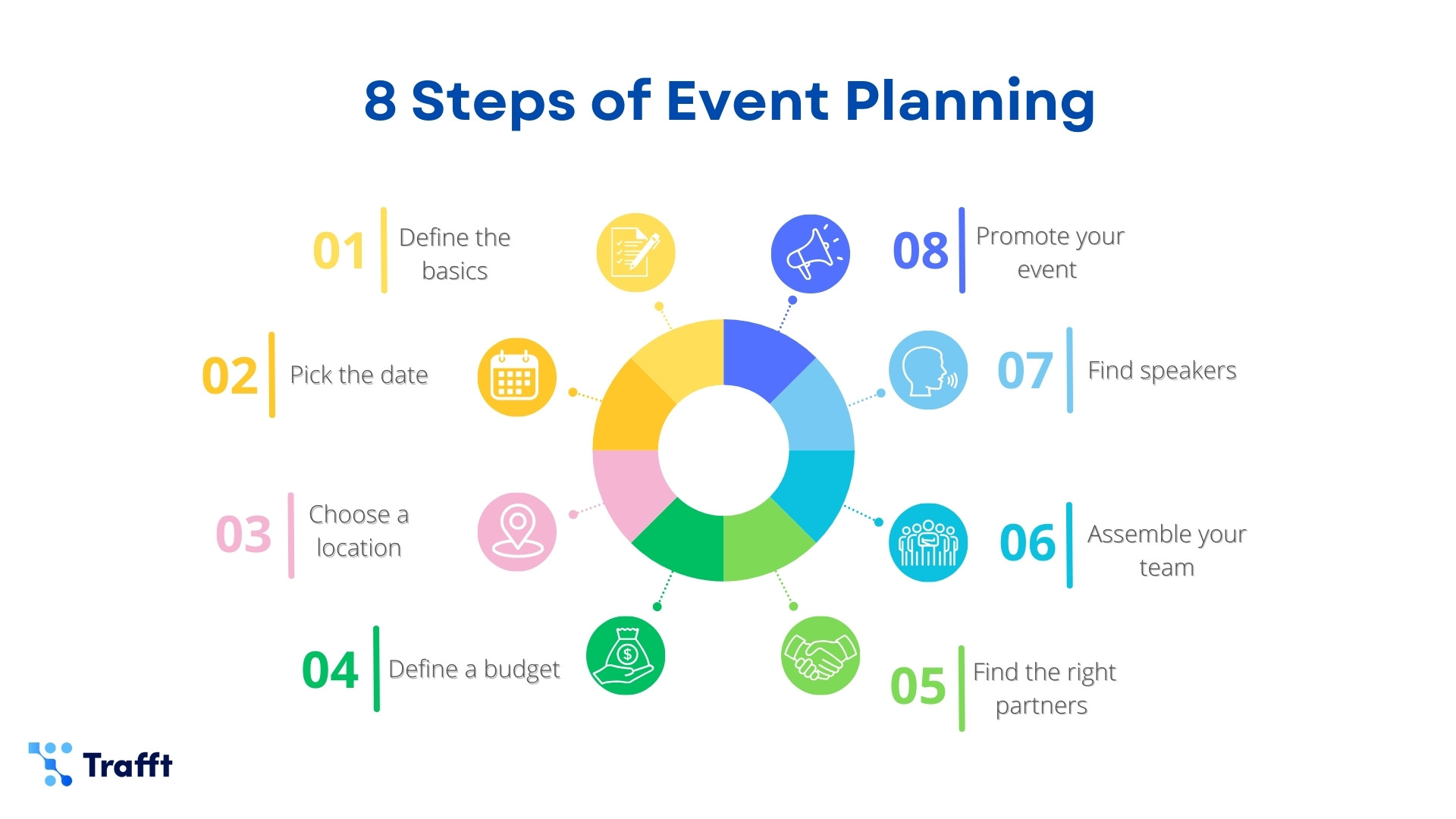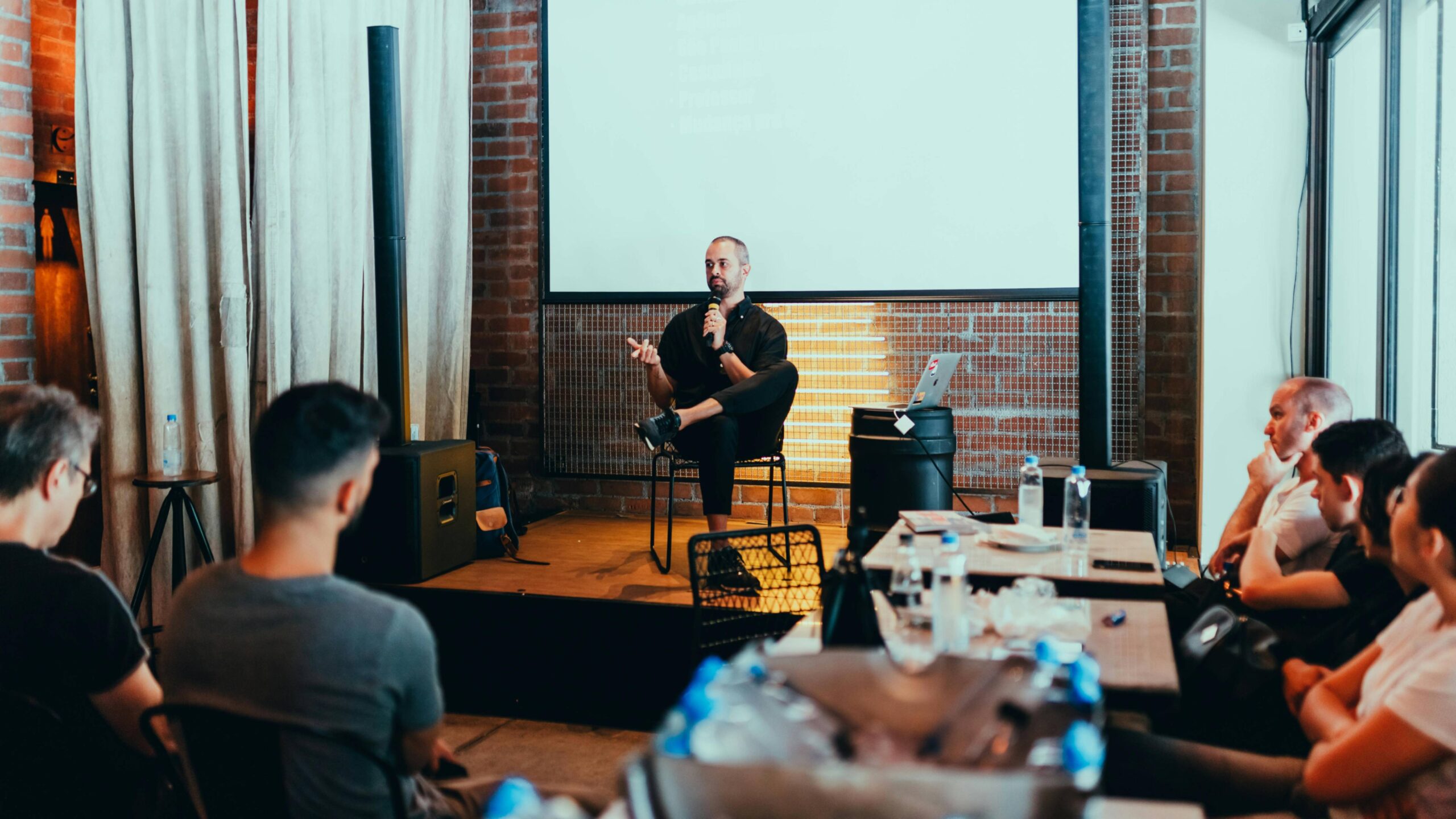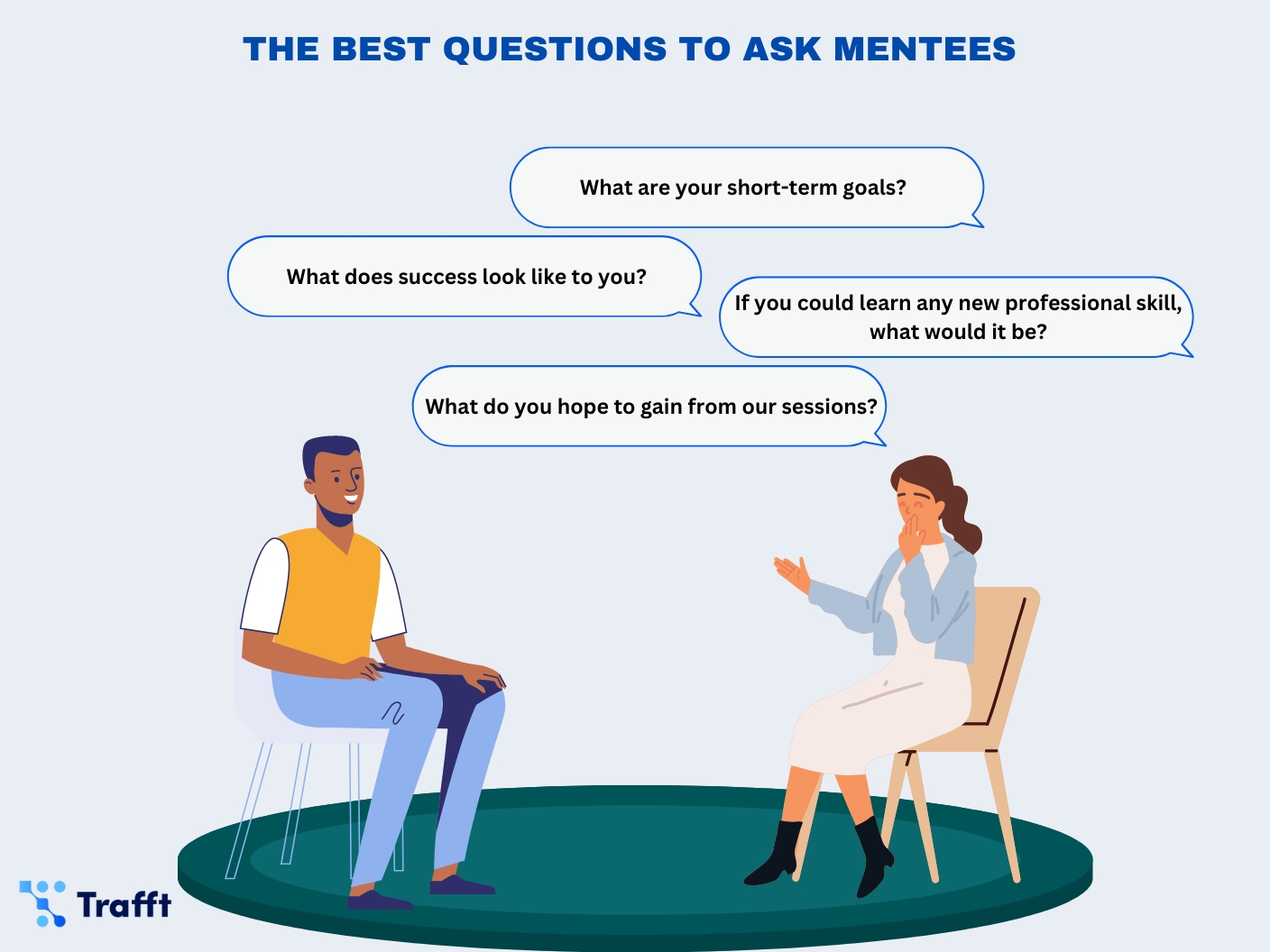When you want to make an event memorable, the best way to ensure success is to put a lot of attention into its planning. No one is going to remember the event if the speakers are running late, or the catering never arrives. Planning is a very important factor, and learning how to plan an event is something useful that can help you make sure you get everything done.
There are five main stages in creating an event:
- Event planning from an idea to an action plan
- Organizing the event and jumping to the execution
- Promoting the event and selling tickets
- Hosting the event and making sure that everything runs smoothly
- Conducting follow-ups and collecting feedback
These stages apply to any kind of event that you may be trying to host. It is always good when you are doing an event to write down any ideas that come to your head. This is not only useful for a current event that you are doing, but also for future ones.
Understanding how to plan an event might take some time, and you will want to take advantage of any tool that you can use. For example, checklists are a great way to make the process easier. Keep reading more about this topic in this article created by our team at Trafft and learn more tips on the event planning process.

Step 1: How to plan an event, the essentials
Here are the key elements that you need to decide on for your event:
- What is the goal of your event? This will help you get a clear image of what you are trying to do and how to prioritize.
- Who is this event for? Understanding who your audience is will help you a lot when you are communicating the strategy together with the channels that you use. Have a goal and missions so you can better decide how you will reach and engage with your audience.
- How many people do you want to reach? If you want to make this a yearly event, then you should aim for growth in attendee numbers annually. If this time is the first event that you are doing, having many attendees is important so you can measure success.
- Choose the date and time that you think is going to suit the best your attendees' schedules.
- Think about the location of the event, because it is going to be very important for the entire dynamic of the project. For example, if you want to pull off a great grand opening, you can use these captivating ideas for a great business start. All of these include hosting your event at your own business.
- What do you need to make it happen? Understanding the resources that you need in order to make everything go well is important. Do you need a team, or do you want to do it on your own? Things like this need to be established before you start to work at the event.
- Planning an event also requires a timeline that will help you out as you are going through the steps being performed.
Step 2: Pick the Right Date

As you can see, knowing how to plan an event relies on a number of factors. One example is being able to offer yourself enough time for preparation in order to get everything done. Deadlines are a good way for event planning management and they should be used for sure by the entire team.
What to consider when you are choosing the event date:
- Allow enough time for the project. Four to seven months is usually enough time, depending on the event that you want to plan.
- Avoid big holidays, unless you want to use a themed event like Halloween or New Year themes.
- Avoid school holidays, especially breaks in winter and spring.
- A good idea is to check for other events that are going on locally. If there are different, larger events happening on the same date, and you want to plan an event than it is better to reschedule. This is because you are going to lose some of the people that might want to come to your event, too.
Step 3: Choose a location

An important step when doing the logistical planning of your event is to create a detailed, to-scale sitemap of the entire space that you have. This is going to include planning not just for each vendor, stage, and toiler, but also where there is going to be overflow space and other valuables.
Have a walk from where the main attractions are going to be at different times of the day. Check if the walkways are big to accommodate the number of people that you have in mind. Having a backup plan is also important especially when the traffic flow gets too big.
What you see on social media channels should not be taken for granted. This industry is becoming more and more creative if we look at the marketing materials. For sure they play an important part when learning how to plan an event. However, some organizers use materials to make spaces look larger, cleaner so basically to fool the people that are going to come.
Here is a list of essentials:
- Find event venues and do some research by visiting potential locations.
- Think about what the best area for your event is.
- You want to go for open space or segmented areas/rooms.
- Make sure venues have the proper licensing for alcohol if you plan to use them.
- Think about the number of people expected at the event.
- Do you want to provide Wi-Fi?
- Does space have the infrastructure that is needed for the project?
- Think about the needed accommodations for anyone with disabilities.
- Are there local vendors that you can partner up with?
Step 4: Build the Event Budget
When calculating all the expenses of your event, you really need to pay a lot of attention to it. A great tool to use is Microsoft Excel, as it can offer different formulas in order to keep in good order the costs. You can start with some of the major categories like rentals, catering, decor, and so on when you are building the list. After that, you can break down all the expenses until they are going to work for you.
Under this section of the to-do list you can add:
- Items and their costs
- Descriptions that provide details about the expense
- Vendors and details about their goods or service
- Estimated costs
- Actual cost
Another thing that you should do when planning to plan an event is to make a final list with all the expenses. This will be useful for future events. You can start with:
- Décor
- Equipment
- Team
- Entertainment
- Insurance
- Marketing
- Software
- Transportation
- Venue
Whether you are hosting the event for yourself or a client, a thorough budget is crucial to doing things right.
Step 5: Identify and engage event partners and sponsors
Finding the right partners and sponsors is an important aspect when you are planning an event. Understanding how all the parties can benefit from supporting you is important. You can hire a professional virtual assistant for logistics and preparation to save time and money.
This step is essential because it can help you cut a lot of costs and you will be able to do even better things with your event. Not only that, but you get more exposure when you attract a partner or sponsor but you also increase the overall chances of success. Because there are more benefactors in the mix your event is going to pose a smaller financial risk to your company or event firm.
Here are some tips that you can use when you are searching for sponsors and partners:
- Go for corporate sponsors that are going to fund a portion of the event. There can be a lot of diversity here, from sponsors that can help you with certain prizes through, goods or services, and so on.
- Try to partner up with community organizations that could help you with assistance in the organizing part.
- Understand the marketing objectives and how certain sponsors/partners can also take advantage of this. Maybe they want some form of advertising through the event. You need to really understand what they need when seeking sponsors. Doing so means that you can give them the best and relevant information when you are approached by a brand.
- Go for the decision-maker in a company or brand. You need to reach the decision-maker when you are pitching your idea or when you are counting on a partnership because you do not want to say the same pitch repeatedly.
Step 6: Assemble your team

Photo by fauxels
If you have reached this step then it means you already have a budget, some ideas for the venue, and a first draft for the day plan. Now comes the next question that you need to answer yourself: who is going to help you make all happen?
When more people are working on the same task it is going to be easier for them to get it done. A good way to determine if you will need a team is to outline the key aspects that must be attended to, together with the entertainment, venue management, and sponsors. When you assign individual roles to team members, this creates a system of accountability. Delegating is powerful, so make sure that you have an active team and do meetings quite often.
Understanding how to plan an event is also connected with understanding how to manage a team. As an event manager, you will be responsible with filling the various roles that are being reported to you together with those that need specific, technical skills although they are not applicable to every event, the below chart is a really good overview of the roles that you might need to staff.
Step 7: Finding Speakers/Entertainment

Photo by Matheus Bertelli
Almost all events that you are going to organize will have some speakers present and finding the right ones can pose a challenge. If you have a line-up of speakers that can deliver great content for your audience than your event is going to have bigger chances to succeed.
In order to get the best speakers when you are planning events, make sure that your team is reviewing them. Make a list with common names to see if you are choosing the right ones for the event you are preparing.LinkedIn is a great source of professionals and you can really find a lot of good speakers on it. Review their profiles, see what kind of events they have attended in the past, and get ready to identify potential speakers for the next upcoming event.
There are also other websites that you can take advantage of where there are thousands of speakers. Speaker Hub, for example, does a great job and you should have no problems using it.
Also, academic journals, bestseller lists, or blogs can be great ways to discover top speakers on certain topics. Use all the resources that the online has and chances are quite big that you will find the people you are looking for. Even friends can help you by giving you referrals. Ask them for recommendations. It is a great approach, and it is not going to take a lot of the time to go towards it.
Step 8: Promote the Event
One of the last steps of learning how to plan an event is the promotion of the event. Even by having some of the most amazing speakers or entertainment line-up you will still need to promote the event. You can do this with a website and by generating content around the event. Online and off-line publicity is also relevant and could encourage registration to your event.
There are different ways that you can try in order to get potential attendees to the event. Cold calls, mailings are great for older prospects and influencers are also a great contact idea that could get the attention of Millennials.
Here are some essentials:
- Create a website fully dedicated to the event where you include all the relevant details.
- Create a #hashtag that is going to be used for social media together with all the marketing materials that are going to be built around it.
- During the event, have a team member create live content for all the social media platforms.
- Send invitations to your email subscribers, this can be a great way to start with people you already know.
- Create a logo for the event. This together with other branding elements are important because they offer immediate recognition of your event.
If you are limited by the budget, you do not have to worry. Branded materials for online marketing will have a low impact on your spending if you are using them in the right way. When you are making marketing, materials make sure you optimize them for the targeted audience you have in mind. Social platforms do not have a universal image size so even this can be a small aspect that could be seen negative by people.
Your Event Day Kit
Once you have a complete view of the event, one of the last steps you need to do when planning an event is to go through each step of it again. This is going to take a lot of time, but you will go at a deeper level and this means there is going to be less room for error.
Write all the details down clearly so that any person from your team can read and understand. When the day of the event arrives, take over the role of observer and manager. Manage the guests and the staff, and focus on the general experience that is being offered by the event itself. Trust the work and preparation that you have done, trust your team.
Understanding how to plan an event is no simple task, and the bigger the event is going to be, the more complex things can become. Understanding your role in creating the event, together with managing your team, is going to help you not only do the event planning but also bring it to reality.
FAQs about planning an event
1. What are the key elements that need to be considered when planning an event?
While organizing an event, it's important to think about the following important factors: the event's goals, a realistic budget, the target audience, a suitable location, a theme or style, securing suppliers, organizing logistics, publicizing the event, and gauging its performance. To ensure a successful event, each of these components needs to be carefully planned and carried out.
2. How far in advance should I start planning my event?
It is advised to begin event planning at least six months in advance. This gives adequate time to plan the event's logistics, reserve the venue, recruit vendors, and publicize it. The size, complexity, and nature of the event will all affect how long it takes to arrange an event. Planning for bigger events may need to begin a year or more in advance.
3. What is the best way to set a realistic budget for my event?
It's crucial to include all of the expenses related to an event in order to create a reasonable budget, including venue rental, catering, equipment rental, decor, personnel, promotion, and insurance. It's crucial to take unforeseen costs into account as well. Comparing prices with those for similar events in the past and getting quotations from several providers are effective ways to guarantee that your budget is reasonable.
4. How do I determine the appropriate venue for my event?
Think about the event's goal, target demographic, budget, and desired atmosphere when choosing the right location. Location, capacity, availability, and facilities are all important considerations. It is advised to personally inspect potential locations to determine their suitability.
5. What are some effective strategies for promoting my event?
Developing a strong brand image, employing social media and email marketing, working with partners and sponsors, and providing early bird discounts and incentives are all effective methods for promoting an event. Depending on the target population, advertising the event through conventional media outlets like print, radio, and television may also be successful.
6. How do I manage logistics such as catering, transportation, and lodging for my guests?
It's crucial to collaborate with trustworthy vendors and create explicit agreements and contracts in order to manage event logistics such as catering, transportation, and lodging for attendees. To make sure that all logistics are correctly planned and carried out, planning and communication are essential.
7. What are some common challenges that may arise during the planning process, and how do I overcome them?
Budget restrictions, unforeseen problems with vendors or guests, and last-minute adjustments to the event's schedule or program are just a few of the difficulties that may come up throughout the preparation process. Flexibility, problem-solving abilities, and efficient communication with all stakeholders are required to overcome these obstacles.
8. How can I ensure that my event is accessible and inclusive for all attendees?
Consider considerations like physical accessibility, linguistic and cultural obstacles, dietary requirements, and sensory sensitivity to make sure an event is inclusive and accessible for all participants. An inclusive atmosphere can also be created by offering alternate forms for the materials and guaranteeing varied representation in the event's preparation and implementation.
9. What type of technology and equipment do I need to make my event successful?
The goal, scale, and nature of an event will determine the kind of technology and equipment required. Audiovisual systems, lighting, sound systems, staging, and interactive technology like crowd response systems and event apps are a few examples of the equipment and technology that are frequently utilized at events.
10. How do I evaluate the success of my event after it has taken place?
After an event has concluded, evaluate its success by taking into account variables like attendance, vendor and attendee feedback, media attention, and financial indicators. These indicators can be analyzed to reveal areas of strength and weaknesses for upcoming events. Throughout the event, data must be gathered in order to make adjustments in real time and guarantee a great experience for all participants. Post-event surveys can offer insightful input to guide future planning initiatives.






